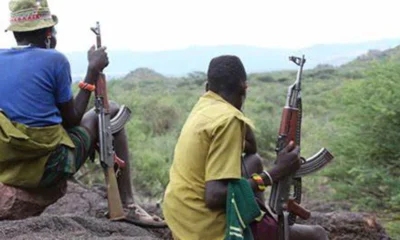







A fire has broken out at the Imaratus Sanan Hotel in the Sharamansur area of Mecca, Saudi Arabia. The hotel...


The Securities and Exchange Commission (SEC) has declared a new meme coin, ‘PUNISHER COIN’ (also known as ‘SPUN’), illegal and...


Akwa Ibom State Governor, Pastor Umo Eno, has disbursed N250 million to 540 beneficiaries in Ikot Abasi Federal Constituency to...


President Donald Trump has issued a stern warning to billionaire Elon Musk, threatening him with “serious consequences” if he backs...


General Overseer of the Redeemed Christian Church of God (RCCG), Pastor Enoch Adeboye, has revealed that God once warned him...


Tension enveloped Chito town in the Adzendeshi Council Ward of Ukum Local Government Area, Benue State, in the early hours...


Operatives of the Ogun State Amotekun Corps, Ewekoro Command, successfully foiled a robbery attempt and rescued a 28-year-old gunshot victim...


Former Head of State, Gen. Yakubu Gowon, has clarified that his decision to lead Nigeria through the Biafra civil war...


In a tragic incident that has shocked residents of Ilorin, the Kwara State Fire Service on Friday recovered the lifeless...


Super Eagles star Wilfred Ndidi has gifted a brand-new white SUV to former Nigeria international and ex-U-17 coach Nduka Ugbade,...


Senior Pastor of House on the Rock, Paul Adefarasin, has broken his silence regarding a viral video showing him allegedly...


Governor Seyi Makinde of Oyo State has called for a constitutional amendment to establish a single five- or six-year tenure...


British-Nigerian art dealer and former BBC Bargain Hunt expert, Oghenochuko Ojiri, has been sentenced to two years and six months...


President Bola Ahmed Tinubu closely watched the live coverage of Governor Umo Eno’s defection from the Peoples Democratic Party (PDP)...


Akwa Ibom State Commissioner for Special Duties and Ibom Deep Sea Port, Ini Ememobong, has resigned from Governor Umo Eno’s...


As Muslims across Nigeria prepare to mark Eid-el-Kabir, many are grappling with skyrocketing prices of food, livestock, and transportation, forcing...


Former Chief Justice of Nigeria, Mohammed Lawal Uwais, has passed away at the age of 89. His family confirmed that...


Governor Umo Eno of Akwa Ibom State has officially defected from the Peoples Democratic Party (PDP) to the All Progressives...


On Thursday, a court temporarily blocked Donald Trump’s latest attempt to prevent foreign students from enrolling at Harvard, escalating the...


Two students of Obafemi Awolowo University (OAU), Oladepo Joshua and Ejike Kelechi, were released from police custody on Thursday evening...















